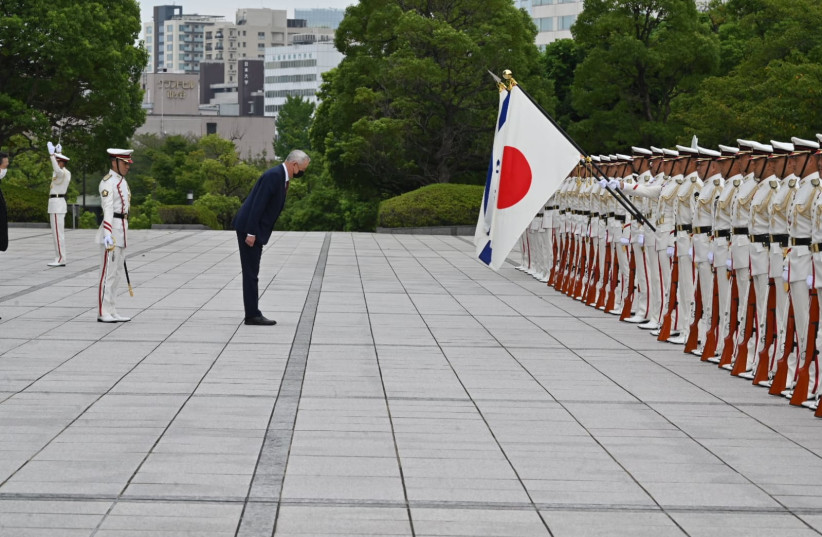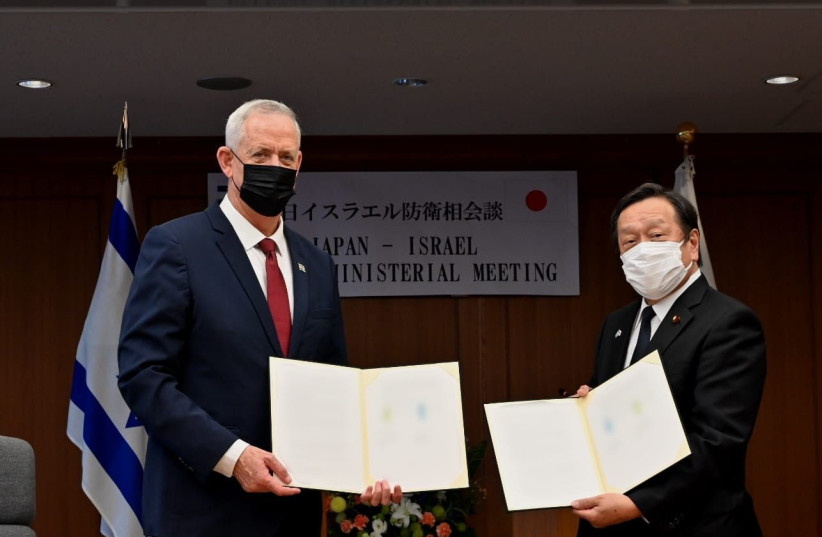Defense Minister Benny Gantz has signed a memorandum for defense cooperation with his Japanese counterpart Yasukazu Hamada which will enable the two countries to widen defense, strategic and military exchanges.
“Our countries share a common goal – defending our homes, and seeking peace and stability. Cooperation between Israel and Japan in developing technology and sharing knowledge will enable us to achieve our common vision,” Gantz said.
"Cooperation between Israel and Japan in developing technology and sharing knowledge will enable us to achieve our common vision"
Defense Minister Benny Gantz
In 2019, Japan and Israel signed a defense memorandum of understanding to strengthen defense relations between the two and the agreement signed on Tuesday had a number of additions that allows for the expansion of cooperation in a variety of fields including air defense.
According to Gantz, with the agreement “we open the doors to technological cooperation, information-sharing, military-to-military activities, and industrial ventures. These activities will strengthen the defense capabilities of each country, as well as our joint contribution to peace and stability in our regions and the world.”
Benny Gantz wraps up 'significant' US, Japan visit
The agreement topped off what Gantz hailed as a significant visit to the United States and Tokyo where he met with senior officials to discuss Iran’s nuclear program and other issues including increasing security cooperation.
“This has been an overall successful visit,” Gantz told reporters during a phone briefing ahead of the signing of the agreement. The visit, he added “will have operative implications both at the level of the military and R&D as well as at the level of defense industries later on.”

During his visit to Japan, Gantz held talks with top officials including Chief Cabinet Secretary Matsuno Hirokazu, National Security Adviser Akiba Takeo and Minister of Foreign Affairs HAYASHI Yoshimasa. Gantz also held a meeting with US Ambassador to Japan, Rahm Emmanuel.
The visit comes “in order to build a framework for greater defense cooperation and strategic ties between the countries,” the Defense Ministry said.
His visit not only marks 70 years of diplomatic ties between Jerusalem and Tokyo but is the first time in over a decade that an Israeli defense minister has visited Japan.
“This visit is central to further deepening our partnership and working together to promote a more stable, secure and free world,” Gantz tweeted when he arrived.
Israel, Japan discuss strategic defense cooperation
Among the topics discussed during the meetings was strategic defense cooperation between Israel and Japan in light of regional and global challenges.
Under former prime mininister Shinzo Abe who was assassinated in July, ties between the two countries flourished with dozens of agreements signed in the fields of innovation and science, security, agriculture, cyber, sport, industrial R&D and more.
According to a study by the Harel-Hertz Investment House, Japanese investment in Israeli firms also increased from some $87 million in 2015 to $2.9 billion in 2021.
Prior to Abe’s assassination, he had been pushing hard to double the country’s defense budget and reduce restrictions on the military after decades of pacifism following World War II. His nationalist government was also influenced by China’s growing power and aggression as well as by North Korea. With Russia’s invasion of Ukraine, there is concern that Beijing might be emboldened to attack neighboring Taiwan, which in turn would affect Tokyo.
Gantz aims for 'united international front' against Iran
According to Gantz, the war in Ukraine has influenced and shifted the perception of security of many countries that in recent years have invested less in security and more in other fields.
“Now they understand that war is not a theoretical threat, it is something that can happen,” he said.
The defense minister also discussed the threat posed by Iran’s nuclear program and told reporters that Tokyo does not want Tehran to have nuclear weapons and that any agreement should guarantee that.
“Global stability is threatened by Iran’s nuclear program and malign activities. I have just returned from a visit to our close, shared ally – the United States, where I discussed the nuclear agreement with Iran. This threat requires a united international front led by the US,” Gantz said.

Japan’s current Prime Minister Kishida Fumio increased the country’s defense budget from 1 percent of the GDP to 2 percent over a five-year period, turning Japan into the world’s third largest defense spender.
According to the Japan Times, in its initial budget for fiscal 2022, Tokyo earmarked a total of ¥5.4 trillion for defense spending.
Defense Attaché to Japan Alon Yehoshua said that Japan is looking to upgrade its military and procurement in a variety of fields following developments across the world.
“Israel sees this as an opportunity both because of the relationship with the US and because of the technological capabilities that Japan has,” he said, adding that during the meetings officials discussed the issue of cyber alot as “the Japanese have a great interest in promoting cooperation.”
According to Yehousha, there have been “a number of fundamental changes” that have happened in the past year and a half, including the sending of an attaché that provides direct contact between Israeli and Japanese security officials and defense ministries. Japan, he said, has sent two attaches to Israel, a move that “reflects a genuine desire of the Japanese to strengthen the cooperation between the two countries.”
Japan, which had traditionally aligned itself with the Arab world due to it being Tokyo’s main oil producer, has shown “greater willingness to cooperate with Israel” since the signing of the Abraham Accords, Yehousha continued, adding that the historic agreement signed in 2020 “also opens up possibilities for us.”
Last week, Israel Air Force Chief of Staff Brig.-Gen. Eyal Grinboim conducted an official visit to Japan, meeting with Japan’s top air force commander General Shunji Izutsu. It was the first time that an IAF official visited the country since 1991.
